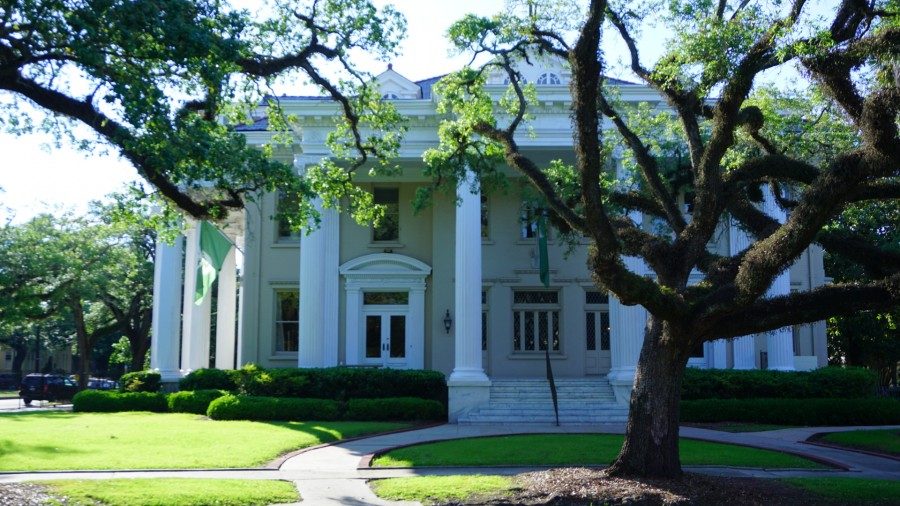Campus maintains connections to legendary capitalist with legacy of colonization
Kabir Shah | Staff Photographer
The President’s mansion on Audubon Place was donated by Sam Zemurray, whose legacy is mired with oppression and colonization.
One night in 1911, under the cover of darkness, revolutionary general-for-hire Lee Christmas slipped away from Secret Service agents in New Orleans who were seeking to ensure that a coup on the Honduran government was not launched from American soil.
Waiting for Christmas a few miles off of the American coast was Sam Zemurray, a banana salesman turned magnate who owned swaths of land in Honduras. With Christmas was Manuel Bonilla, a former Honduran general living in exile whom Zemurray wanted to install as Honduran president.
They would be kicking out Miguel Dávila, who prevented Zemurray from running his land free from the oversight of the Honduran government.
On Zemurray’s boat, the insurgency set course for Honduras. Years later, Zemurray, a rags-to-riches Russo-Jewish immigrant to New Orleans and kingpin of a capitalist empire, would come to be known as the banana king.
In 1912, Zemurray, a prominent philanthropist, gave Tulane University the donation it would use to found the Tulane School of Hygiene and Tropical Medicine, which today is known as the School of Public Health and Tropical Medicine.
Zemurray gave one million dollars in total to Tulane, a school he wished to elevate to the ranks of the great universities in the world.
A reliable benefactor of Tulane during his life and even in death, Zemurray left his Audubon Place mansion to be used as the residence of Tulane’s president. Other tributes to Zemurray and his family can be found throughout campus.
The stone pavilions in Willow are named Doris, Zemurray and Stone after him and his daughter. The Roger Thayer Stone Center for Latin American Studies bears the name of his son-in-law.
Rich Cohen, author of “The Fish That Ate the Whale: The Life and Times of America’s Banana King,” views Zemurray’s philanthropy, especially in his donations to Latin America in later life, as a contrition for wrongs he realized he had committed.
Zemurray’s United Fruit Company and Cuyamel Fruit Company were colonialist forces responsible for widespread political instability in Latin America and the oppression of its people.
Many historians say his climb from poverty to the heights of the American Dream was on the backs of thousands of virtually enslaved workers for whom any form of protest could yield devastating losses.
In 1928, 32,000 Colombian banana workers went on strike against UFCO, which first attempted to quell the movement with its own forces, but soon brought in government reinforcements.
Fun fact! Zemurray made his $$ by violently toppling an elected gov in Honduras! #Tulane http://t.co/gJ30RVK0gO https://t.co/gc1yWvTKR3
— Andrew Tuozzolo (@ATuozzolo) July 24, 2015
The event went down in history as the “banana massacre,” and though the exact number of fatalities is unknown, Gabriel García Márquez immortalized the event in his novel “One Hundred Years of Solitude,” in which he cited 3000 deaths.
Besides the United Fruit Company’s direct impact on its laborers, its widespread political power introduced other forms of oppression to society at large in Latin America. UFCO used its existing political influence to impose segregationist policies inspired by American Jim Crow laws.
In the wake of the controversy surrounding Hebert Hall, after the Undergraduate Student Government led an effort to rename the building, there has been no such conversation about Zemurray’s legacy on Tulane’s campus.
“The method that Tulane’s administration has been using is the Yale standard … which states that the university would only rename a building if it was originally named after someone’s negative contributions to society, not their positive …” Sonali Chadha, USG director of Diversity and Inclusive Excellence who co-authored the Hebert Hall legislation, said. “Basically, that’s Tulane administration’s way of saying that they will turn a blind eye to the racist legacies so many namesakes in this campus have left behind because they have some sort of positive contribution.”
Fact: In 1912, Samuel Zemurray donated $25,000 to fund the 1st School of Hygiene and Tropical Medicine, now known as @TulaneSPHTM. #Tulane
— Tulane WFMO (@tu_wfmo) December 30, 2013
Others view Zemurray’s legacy with more mixed feelings.
“Zemurray’s background was tough,” Professor Kris Lane, who specializes in colonial history in Latin America, said. “And he overcame great obstacles. At the same time, his actions – or those of United Fruit – have not been forgotten in most of the countries where I work, including Colombia and Ecuador. Our histories are deeply intertwined for better or worse.”
United Fruit Company survives today as the corporate ancestor of Chiquita Brands International, which is headquartered in Switzerland and employs more than 20,000 people worldwide. The company signed a “historical agreement on rights for banana workers” with the Latin-American Coordination of Banana Workers Unions (COLSIBA) in 2001 and won the “Corporate Conscience Award” from Social Accountability International in 2004.
Correction: a previous version of the article spelled one of the writer’s names wrong. Her name is Alejandra González Vargas.
Leave a Comment
Your donation will support the student journalists of Tulane University. Your contribution will allow us to purchase equipment and cover our annual website hosting costs.

















joseph martin • Jun 12, 2019 at 9:43 am
It should be noted that Zemurray took over operation of United Fruit in 1932, after the “banana massacre.”